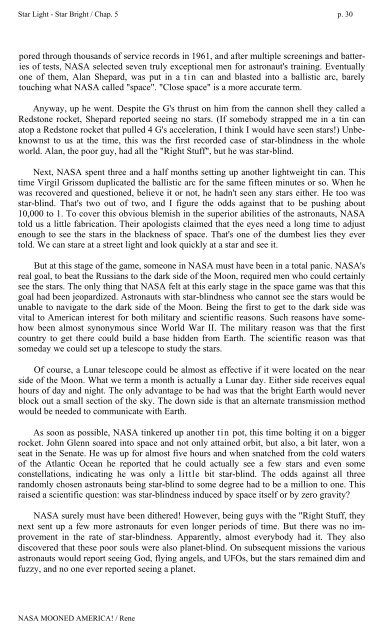Rene-NASA-Mooned-America
Rene-NASA-Mooned-America
Rene-NASA-Mooned-America
Create successful ePaper yourself
Turn your PDF publications into a flip-book with our unique Google optimized e-Paper software.
Star Light - Star Bright / Chap. 5 p. 30<br />
pored through thousands of service records in 1961, and after multiple screenings and batteries<br />
of tests, <strong>NASA</strong> selected seven truly exceptional men for astronaut's training. Eventually<br />
one of them, Alan Shepard, was put in a tin can and blasted into a ballistic arc, barely<br />
touching what <strong>NASA</strong> called "space". "Close space" is a more accurate term.<br />
Anyway, up he went. Despite the G's thrust on him from the cannon shell they called a<br />
Redstone rocket, Shepard reported seeing no stars. (If somebody strapped me in a tin can<br />
atop a Redstone rocket that pulled 4 G's acceleration, I think I would have seen stars!) Unbeknownst<br />
to us at the time, this was the first recorded case of star-blindness in the whole<br />
world. Alan, the poor guy, had all the "Right Stuff", but he was star-blind.<br />
Next, <strong>NASA</strong> spent three and a half months setting up another lightweight tin can. This<br />
time Virgil Grissom duplicated the ballistic arc for the same fifteen minutes or so. When he<br />
was recovered and questioned, believe it or not, he hadn't seen any stars either. He too was<br />
star-blind. That's two out of two, and I figure the odds against that to be pushing about<br />
10,000 to 1. To cover this obvious blemish in the superior abilities of the astronauts, <strong>NASA</strong><br />
told us a little fabrication. Their apologists claimed that the eyes need a long time to adjust<br />
enough to see the stars in the blackness of space. That's one of the dumbest lies they ever<br />
told. We can stare at a street light and look quickly at a star and see it.<br />
But at this stage of the game, someone in <strong>NASA</strong> must have been in a total panic. <strong>NASA</strong>'s<br />
real goal, to beat the Russians to the dark side of the Moon, required men who could certainly<br />
see the stars. The only thing that <strong>NASA</strong> felt at this early stage in the space game was that this<br />
goal had been jeopardized. Astronauts with star-blindness who cannot see the stars would be<br />
unable to navigate to the dark side of the Moon. Being the first to get to the dark side was<br />
vital to <strong>America</strong>n interest for both military and scientific reasons. Such reasons have somehow<br />
been almost synonymous since World War II. The military reason was that the first<br />
country to get there could build a base hidden from Earth. The scientific reason was that<br />
someday we could set up a telescope to study the stars.<br />
Of course, a Lunar telescope could be almost as effective if it were located on the near<br />
side of the Moon. What we term a month is actually a Lunar day. Either side receives equal<br />
hours of day and night. The only advantage to be had was that the bright Earth would never<br />
block out a small section of the sky. The down side is that an alternate transmission method<br />
would be needed to communicate with Earth.<br />
As soon as possible, <strong>NASA</strong> tinkered up another tin pot, this time bolting it on a bigger<br />
rocket. John Glenn soared into space and not only attained orbit, but also, a bit later, won a<br />
seat in the Senate. He was up for almost five hours and when snatched from the cold waters<br />
of the Atlantic Ocean he reported that he could actually see a few stars and even some<br />
constellations, indicating he was only a little bit star-blind. The odds against all three<br />
randomly chosen astronauts being star-blind to some degree had to be a million to one. This<br />
raised a scientific question: was star-blindness induced by space itself or by zero gravity<br />
<strong>NASA</strong> surely must have been dithered! However, being guys with the "Right Stuff, they<br />
next sent up a few more astronauts for even longer periods of time. But there was no improvement<br />
in the rate of star-blindness. Apparently, almost everybody had it. They also<br />
discovered that these poor souls were also planet-blind. On subsequent missions the various<br />
astronauts would report seeing God, flying angels, and UFOs, but the stars remained dim and<br />
fuzzy, and no one ever reported seeing a planet.<br />
<strong>NASA</strong> MOONED AMERICA! / <strong>Rene</strong>


